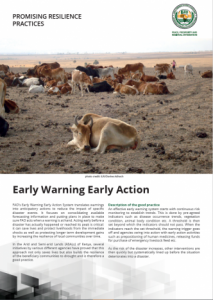Resource

Early Warning Early Action
Authors: IGAD
Date: 2019
Type: Good Practice
Abstract:
FAO’s Early Warning Early Action System translates warnings into anticipatory actions to reduce the impact of specific disaster events. It focuses on consolidating available forecasting information and putting plans in place to make sure FAO acts when a warning is at hand. Acting early before a disaster has actually happened or reached its peak is critical: it can save lives and protect livelihoods from the immediate shocks as well as protecting longer term development gains by increasing the resilience of local communities over time. In the Arid and Semi-arid Lands (ASALs) of Kenya, several initiatives by various different agencies have proved that this approach not only saves lives but also builds the resilience of the beneficiary communities to drought and is therefore a good practice.
Resource file: Promising Practice-Kenya-Early Warning Early Action
